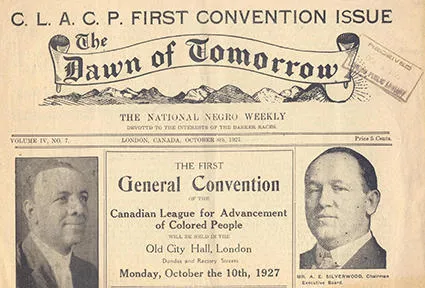Date of Plaque Unveiling: 21 October 2009
Speakers: David Jenkins
Location: 95/97 Glenwood Avenue, London, ON (former home of the Jenkins/Howson families)
History
The Dawn of Tomorrow was founded by James F. Jenkins and the first issue was published on July 14, 1923 from the Jenkins family home at 95/97 Glenwood Avenue in London, Ontario. Jenkins, one of Canada’s most notable Black leaders, was born in Forsyth, Georgia in 1884. He experienced firsthand the ingrained discrimination and segregation of the American South. Educated in the liberal arts, James had worked with the influential black intellectual and activist W.E.B. Du Bois. Jenkins arrived in London in 1907 and was aware that Canadian Blacks faced many obstacles. During World War One, some Blacks who had tried to enlist in the Canadian army were rejected because of their colour. After the war, racial tension grew and the Ku Klux Klan made headway. At the same time, Black communities were scattered, making communication between them difficult. In launching The Dawn of Tomorrow, Jenkins wrote, “It is to be remembered first, our people in Canada do not possess a newspaper, second that the circulation of the American colored newspapers in Canada is very small, and third, very little news of our people in Canada is in American publications.” He knew it was important for Blacks to stay connected for mutual support. The name he gave his paper highlighted the positive message he intended.
In his newspaper, Jenkins explored how Black Canadians and Americans could work together. In the United States, racial boundaries were clearly marked and segregation was legal. In Canada, race relations were unequal but this issue was not discussed. The Dawn of Tomorrow wrote about the accomplishments of Black Canadians, stimulated racial pride and helped forge a Black Canadian identity.
Jenkins knew London historian, Fred Landon, Chief Librarian at the London Public Library and later at The University of Western Ontario. Landon wrote extensively about the history of Blacks in Ontario and, in what was a fruitful partnership, The Dawn of Tomorrow reprinted many of his articles.
Out of Jenkins’ work for inter-community co-operation and Black advocacy came the formation, in 1924, of the Canadian League for the Advancement of Colored People (CLACP). Jenkins was named Executive and Organizing Secretary and The Dawn of Tomorrow, its official publication. The League and The Dawn of Tomorrow sought to coordinate the efforts of Black organizations, fight discrimination in hiring practices, improve the conditions of Blacks in Canada, promote education for young Blacks and serve as a watchdog for racist incidents.
Jenkins died suddenly on May 6, 1931 of complications following surgery, leaving behind his wife, Christina E. and their eight children. She carried on with The Dawnof Tomorrow and when she remarried her whole family helped with the paper. A strong community leader in her own right, Christina managed the enterprise until her death on May 8, 1967, whereupon her children continued her work.
Publications continued until 2013.
There are microfilm copies of The Dawn of Tomorrow at the London Public Library and at Weldon Library, Western University.

